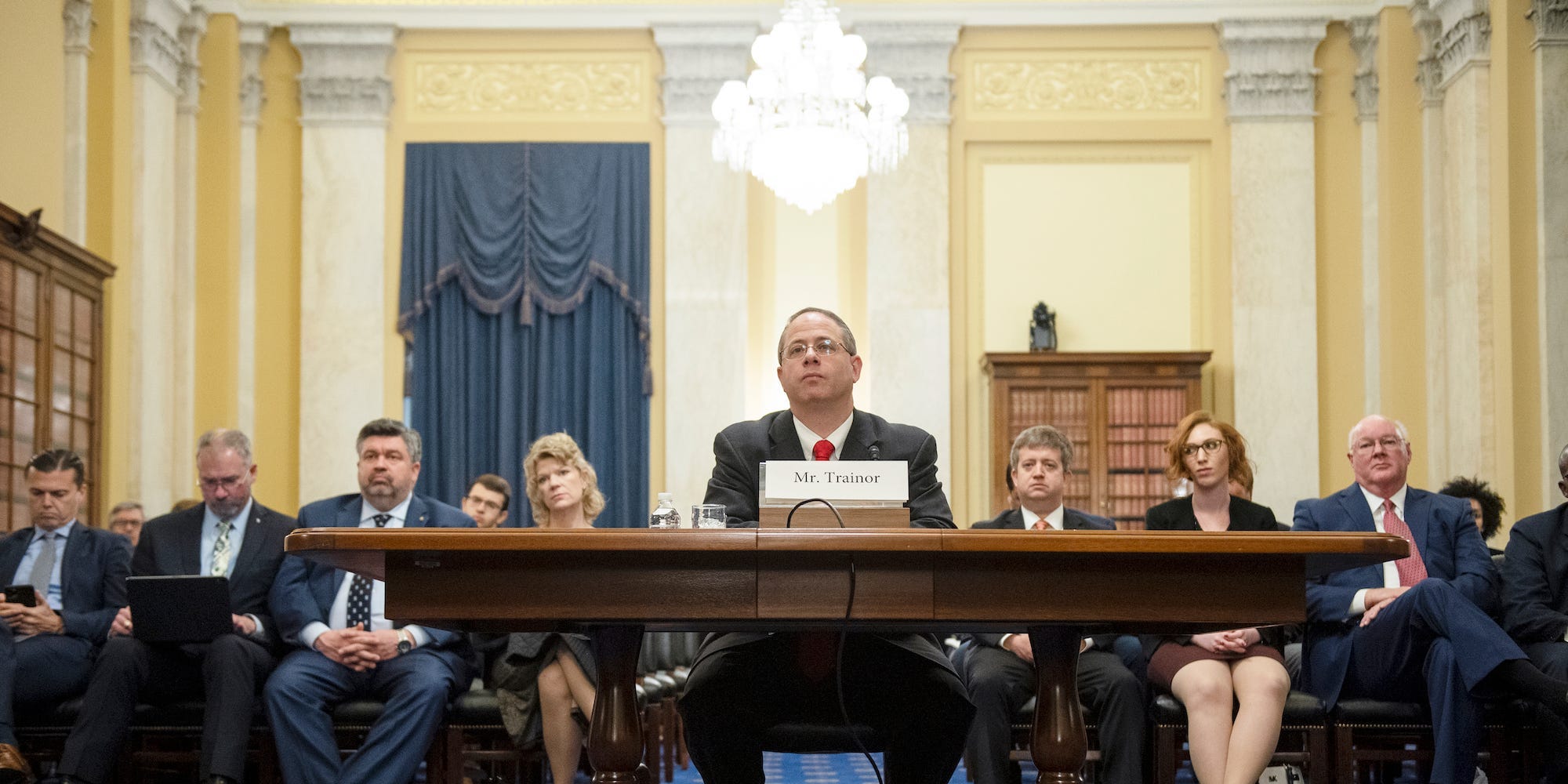
- Conservatives filed several FEC complaints in recent years alleging anti-conservative bias on social media.
- But the commission has been unanimously siding with companies like Twitter and Snapchat in each case.
- "It really is the wrong vehicle to go after social media companies," says one GOP commissioner.
In the last three years, conservatives have lodged a series complaints with the Federal Election Commission charging social media companies with anti-conservative bias over content moderation that have seemingly affected Republican politicians more than Democrats.
But they've been unanimously rebuked each time.
"We just kind of got a flurry of complaints, and we considered a bunch of them together," said Democratic Commissioner Ellen Weintraub in a telephone interview with Insider. Alongside five other commissioners, she's been in charge of weighing the merits of each case and ultimately taking a vote.
As the agency tasked with overseeing the nation's campaign finance laws, the FEC has been asked by a myriad of conservatives to decide whether these content moderation decisions can be classified as corporate in-kind contributions, which are illegal under federal election laws.
In the Trump era especially, these companies became a primary venue for political rhetoric and debate, with growing concerns that they could be a mouthpiece for then-President Donald Trump and others who promoted conspiracy theories and raised the risk of violence.
But whether it's temporarily shadow-banning Rep. Matt Gaetz, affixing a fact-check label to Trump's tweets, removing Trump's content from a curated Snapchat news feed, or refusing to verify a candidate with a history of extreme statements, the commission has continually sided with social media companies.
Among the more high-profile cases involved Twitter's throttling of a New York Post story about Hunter Biden. Lawyers for the Republican National Committee argued that the social media giant had broken federal election laws by essentially making a corporate in-kind contribution to then-candidate Joe Biden.
But in response, Twitter cited their 2018-era "Distribution of Hacked Materials Policy," and the commission bought their argument.
Republican Commissioner Trey Trainor appeared on Glenn Beck's talk show a few days after the rulings were first reported by the New York Times where he sought to explain his decision in conservative terms.
"If we were to say that the decision to throttle the Hunter Biden story was a violation of campaign finance, then we would have a flood of complaints," said Trainor, who serves with two other Republican commissioners. "Everybody on the right would've gotten a complaint filed against them immediately."
'That's not what we do'

At the heart of each of these disputes is a portion of federal campaign finance law governing how politicians, parties, and PACs can interact with corporations — a category that now includes social media companies, despite the fact that the law was designed for more traditional providers of goods and services.
"Corporations are prohibited from making contributions to candidates or political parties, but corporations interact with campaigns and political parties in any number of different ways," said Brendan Fischer, director of federal reform at Campaign Legal Center.
That dynamic, he says, makes the question of whether a corporation is making a decision for legitimate commercial reasons — rather than simply influencing an election — an especially important one.
Charlie Spies, a prominent GOP lawyer who represented Florida Republican congressional candidate Anna Paulina Luna in an FEC complaint over Twitter's refusal to verify her, told Insider that he believes that social media platforms are obligated to give candidates equal access to corporate resources — in this case, a blue check on Twitter — lest they run afoul of those rules.
"You can't pick and choose who you're going to give corporate resources to," said Spies.
But Weintraub disputed Spies's assertion, pointing to FEC precedents that ensure companies can take actions that may sway an election as long as they have a legitimate business reason to do so.
"What he's talking about are situations where there isn't a bona fide commercial reason and it's just a purely political call, that they only want to support one side," she said. "We generally will not second-guess the business purpose of a business entity. That's not what we do."
What's new in these cases, says Fischer, is the application of decades-old laws to "social media companies that are increasingly adopting stricter content moderation policies."
Social media companies have come under pressure from both sides, given their outsize role in shaping public debate.
While liberals have pushed for tighter regulation around hate speech, extreme content and conspiracy theories, conservatives have increasingly come to view social media platforms — and Big Tech generally — as being biased towards the left. As platforms have opted to take more responsibility for content published on their sites, conservatives have cried foul.
"I'm not sure the issue was raised before with respect to social media companies," said Weintraub.
Trainor told Beck that it's understandable for conservatives to be calling on the FEC to help, noting that it's "easiest to go after." But, he cautions, federal campaign finance law hasn't been updated in nearly 20 years.
"They're trying to apply a statute that deals with technologies that no longer exist, and apply them to technologies where today, people get all of their news," said Trainor.
'We'll see what kind of reaction that gets'

Spies, the prominent Republican attorney in seeking to illustrate his point further, posed a hypothetical situation in which a liberal files a complaint against an openly right-wing social media network — think Parler, Gab, or Trump's forthcoming "TRUTH Social" — that relies on ad revenue from fossil fuel companies, an industry that benefits from Republican rule.
"They could say, well, we think allowing Democrats to have accounts on our site is against our commercial interests," said Spies. "We'll see what kind of reaction that gets."
But the reaction, it seems, would likely be a simple thumbs-up from the commission.
"If they had a business reason for leaning one way or the other, we would probably respect that," said Weintraub, again referring to a passage in the commissioner's statement of reasons in Luna's case clarifying that the FEC doesn't care if the outcome of a legitimate business practice is nonpartisan.
"They can have a partisan slant," she said.
"Parler or Gab could likely make a similar commercial argument that their business model is premised on appealing to particular audiences with a particular ethos," said Fischer, echoing Weintraub. "Then their application of these pre-existing rules against a Democratic candidate would be made for commercial reasons, rather than political reasons."
Trainor, who is otherwise sympathetic to conservatives when it comes to claims that the 2020 election was illegitimate, underscored that it's just not the FEC's job to get involved with how social media platforms are governed.
"We don't want to be in the business of regulating how businesses are run and what editorial decisions they make," he told Beck. "It really is the wrong vehicle to go after social media companies."
With the FEC taking an agnostic approach to social media platforms' content moderation practices, and the prospects for any successful bipartisan initiatives on Big Tech remaining dim, the status quo seem likely to maintain intact despite simmering conservative anger over perceived mistreatment by tech platforms.
And it may only get more tense, given intensifying conservative suspicion of Twitter's new CEO, Parag Agrawal, after an 11-year old tweet condemning Islamophobia surfaced on Twitter this week.
—Parag Agrawal (@paraga) October 26, 2010
Trump, fully banned from Twitter, is now attempting to create a successful right-wing alternative to the company that Spies deemed a "new public square" in his complaint on behalf of Luna last year.
But at any rate, Spies says he sees Twitter's "bona fide commercial reasons" justification as nothing more than a "post-hoc rationalization" by a company run by liberals.
"Twitter's not charging their favorite liberals to have blue checkmarks that expand their reach," he said. "They're giving them out for free, but they're just picking and choosing who they give them to."
But again, Weintraub insisted that it's not the FEC's job to make that call.
"We're not going to weigh in on that," she said, laughing.
